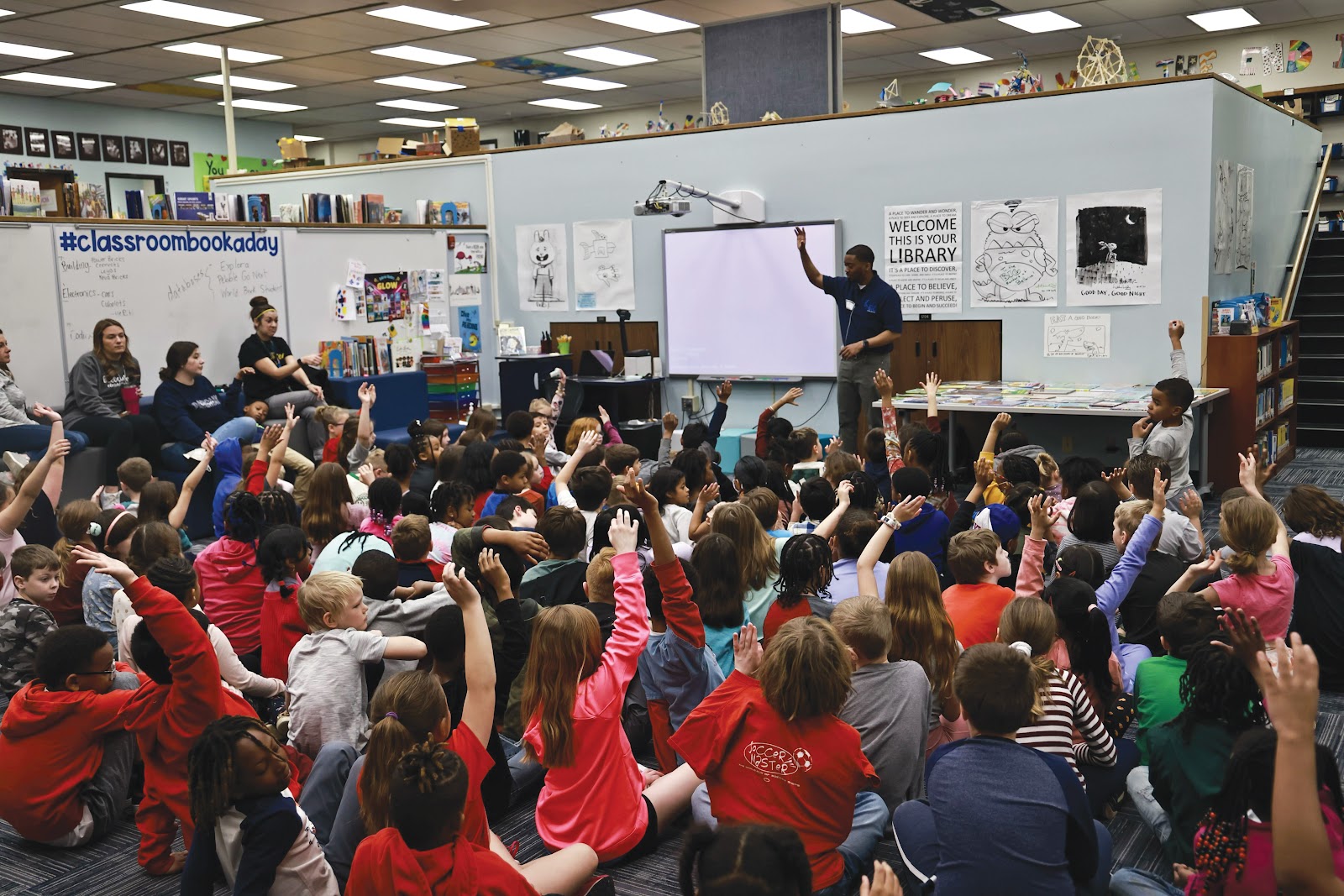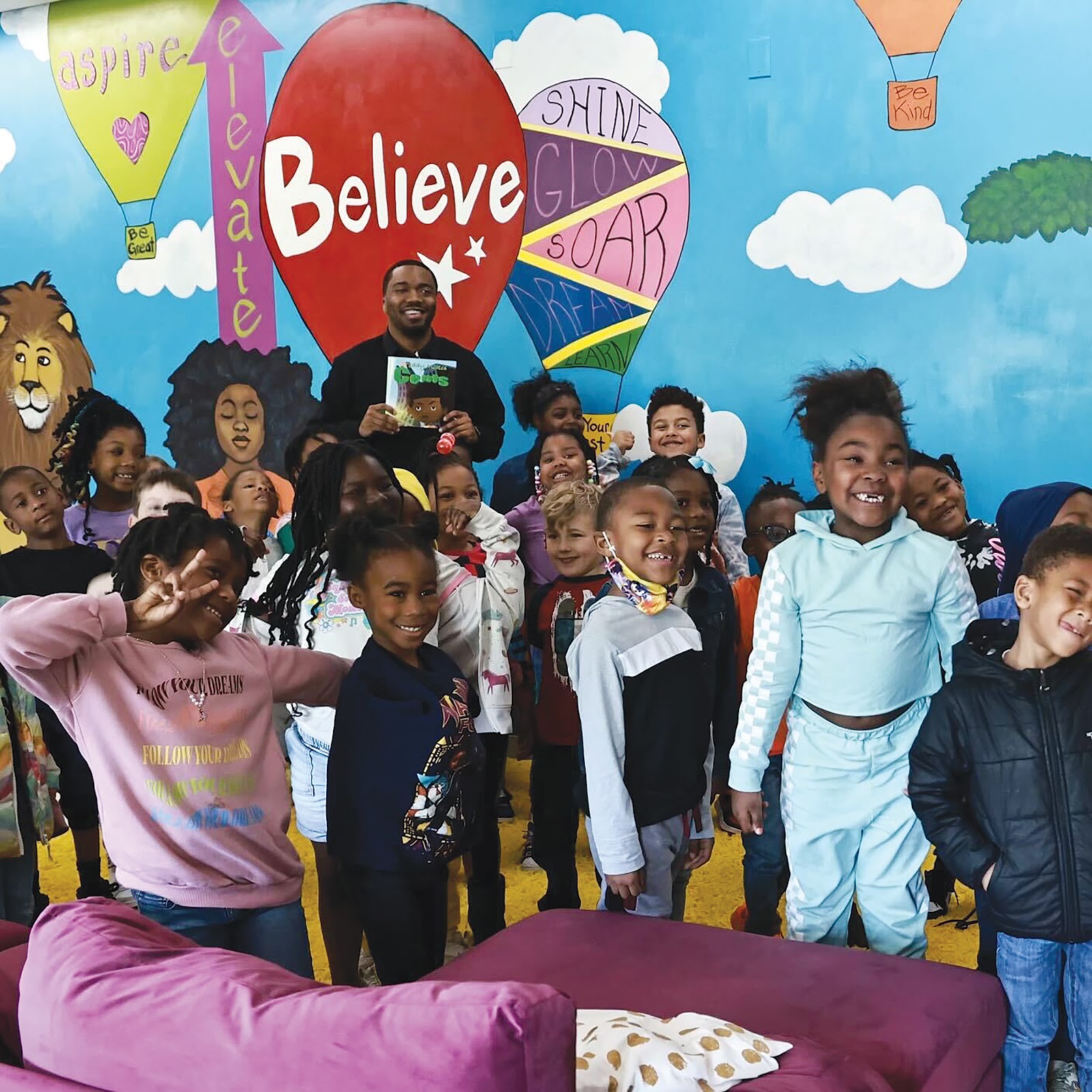It’s never too early to start learning how to handle money, believes Thomas Dear III. The former banker-turned-IT specialist is on a mission to help children develop financial skills at an early age that will set them up for a better life.
Drawing on some of his childhood experiences, he has written a picture book for kindergarten-through-third graders that he shares with students in St. Louis-area schools. “It’s about that quote, ‘Be the person you needed when you were younger,’” he says.

I was fortunate enough to have a lot of positive influences in my life.
THOMAS DEAR III
“A lot of times, I didn’t realize how fortunate I was, and how a lot of people don’t have that.”
Teddy Makes Cents centers on a third grader—whose name comes from Dear’s childhood nickname—who lives in a community-friendly town where he learns about financial responsibility from family and neighbors. By the end of the story, he understands the difference between wants and needs and has decided to stop spending all his money frivolously on favorite things like ice cream and open a savings account (just as Dear did when he was young).
In school visits, Dear has been able to encourage children to think creatively about money. He has taken supplies in and had groups come up with their own ice cream cones, deciding on the flavors and what they should be named and how much they should sell them for. “The idea is to shift their minds to business,” Dear says.
He first became aware of the need for financial literacy as a young banker when helping lead a Junior Achievement program at a school. Over the course of the eight-week event, he saw how students “who couldn’t even pronounce entrepreneur” became interested in learning about business and money management. “I wanted to continue that effort.”

If you can learn some of these things at an early age, you are going to be good.
In Teddy’s story and in recalling his own life, Dear emphasizes the importance of “the village” in nurturing children. “I’m grateful for the many positive influences I was able to have in my life and I want to be able to do the same thing for others. If you can learn some of these things at an early age, you are going to be good.”
Some of Dear’s own early lessons about money went in. He and a friend ran a successful lemonade stand one summer (he notes that passersby were happy to reward young people they saw “putting forth some effort”) and in high school he got his first real job, working at a movie theater.
Despite all the positive influences, Dear acknowledges he hasn’t always gotten it right, however. A self-admitted “mediocre” student for much of his early schooling, “the light bulb went off” when he was a high school junior. He saw friends who were pushing themselves to do well and getting scholarship offers.
“I started to ask, ‘What’s next for me, outside of just working at nine to five? What is it that you want out of life?’ So, I started to get serious. I got involved with various organizations, which allowed me to get into college and when I got there, I hit the ground running—a lot of things that I didn’t do or take advantage of when I was in high school.”
Father figures
Graduating from the University of Southern Illinois-Carbondale with a degree in economics, Dear spent two years as a financial consultant with Commerce Bank. That time opened his eyes further to the struggles many people have understanding the basics of money management—debit, loans, interest and so on. “It was a real learning experience.”
Though Dear switched career tracks—he is now in IT as a scrum manager with integrated software platform Entegral—he carried his concern over financial literacy with him. What he had learned about business shaped the way he went about his mission.
Rather than seek a contract with another publisher, after analyzing the potential returns on that kind of a deal, Dear decided to create his own business: “I didn’t want to sell myself short, especially on something that I’ve devoted so much time and money to.” The result was Dream Big Publishing (“No dream is ever too small!”), through which he intends to publish a Teddy sequel and other books. The company name is intended to show children “that anything that you want to do in life is possible—anything you can think of, anything that you put your mind to.”
With illustrations by artist Demar Douglas, Teddy Makes Cents was released last year. Dear promoted the launch with special events at Black-owned bookstores in Phoenix (Grassrootz); Charleston, South Carolina (Turning Page); and University City (EyeSeeMe).
One of the highlights of Dear’s lunchtime and after-classes visits has been returning to Pershing Elementary School, where he was a student. Meeting one of his old teachers, Mrs. Daniels, “was such a joyful experience,” he says. “She was definitely thrilled and happy and I was as well.”
Dear’s book has an important secondary message woven into it. Among the big influences in Teddy’s life are his father and Mr. Bennett, who lives across the street. “I felt it was important, while we’re having a conversation about money, also to shift the narrative of male figures being present in young people’s lives, whether that’s young African American women or young African American males,” says Dear.
So many times, the emphasis is on Black men being absent from their families and communities, “and I just wanted to just shed light on that father figures are there, day in and day out,” he explains. “We have those people there devoting their time just like mothers are, and I don’t think they get enough credit. I wanted to show this young African American male who comes from a two-parent household and who also has other male influences that are pouring positive things into him.”
Teddy Makes Cents has also provided other helpful lessons. Dear’s visit with students at Larimore Elementary School, where he spoke about the book, “made the writing process real and relevant,” says principal Kimberly Burroughs-Neeley. “Students will still pick the book out in their classroom libraries and read during independent reading.” Teachers also use it to reinforce key math and English language arts.
While wanting to give children a head-start, Dear recognizes that financial health is an ongoing process. He is buying a condo (“having some equity means I have options”), has paid off his car loan (“a huge win for me”) and has plans to invest in rental property. “I’m not doing too bad,” he says. “I am not there, but I’m working toward it.”
THOMAS DEAR: MY WAYMAKERS
Definitely my parents. My father was a provider. He was someone that was going to make sure we never went without. I get that work ethic from him. Something that he likes to say is, “You gotta get it,” meaning don’t let any obstacles, don’t let anything, stop you from working towards your goal. The same goes for my mother; she made a lot of sacrifices for me. All those years growing up, whether it was sports or whatever, she made those sacrifices to give me a better life. So, when I have kids, I want to be able to do the same thing and give them the same opportunities that I was afforded by my parents.


